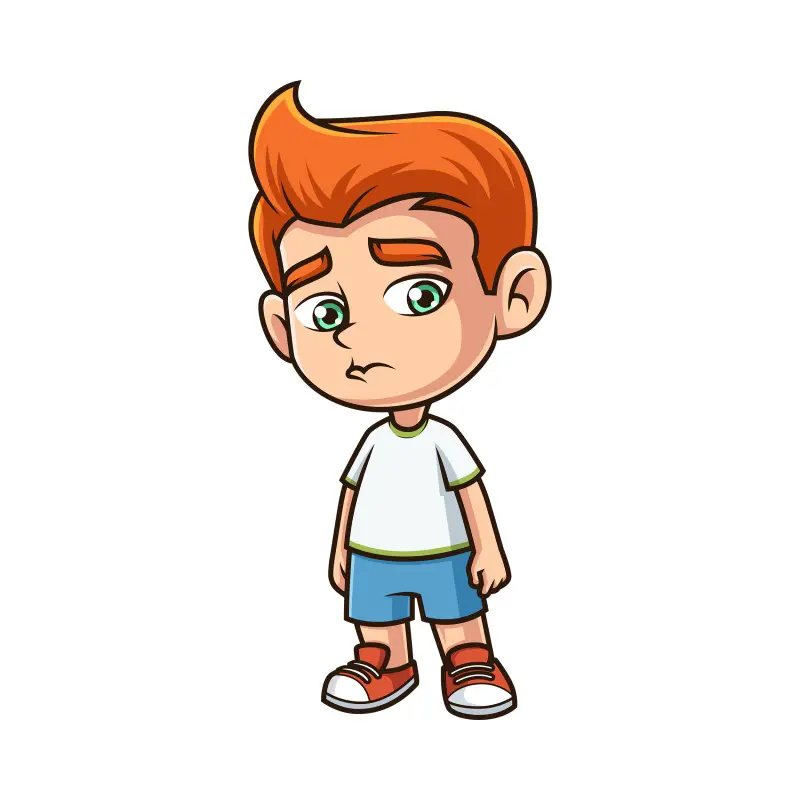Eeyore from Winnie-the-Pooh by A.A. Milne (available on Amazon) is likely borderline depressive and certainly a clear example of a dry personality. Yet Eeyore happens to be the favorite Pooh character for many fans, including me. His polar opposite is ‘Tigger’, who I think is super annoying! Given that this beloved donkey is a childhood classic, should you be concerned about a dry personality for kids in general?
Parents of kids with a dry personality are right to be concerned since a dry personality can indicate boredom, sadness, or even depression. However, parents shouldn’t jump to conclusions either. Assess your child fully, then determine if support is needed. Not all dry personalities are problematic.

As a mom and teacher, I’ve spent decades dealing with a child’s personality and whether or not if it’s normal or typical. I’ve filled out countless forms for doctors about student behavior and how that impacts his or her quality of life, in my ‘expert opinion.’ As such, my background gives me a unique perspective on this topic.
One way to build humor with your kids is to use it strategically through routines or regular activities. For instance, our Fun Jokes For Kids Coloring Book is a great tool for embedding humor through kid-friendly activity.
I’ll share what I’ve experienced over the years related to children’s personality and development; what it means if it is ‘dry’ or other; and suggestions for handling that. Keep reading to learn more!
Contents
What does it mean to have a dry personality or be a dry person?
So let’s first approach this with a good understanding of what’s meant by ‘dry personality’.
A dry personality, also called being a dry person, generally means someone doesn’t show overt emotions; has a monotoned voice; is considered expressionless or has a constant bland expression; and rarely gets excited. He or she may be thought as serious, intelligent, and/or rude or cynical, too.
As a teacher, I’ve dealt with many different types of personalities in both kids and adults (colleagues, staff, parents, and so on). Because of this, I’ve been privy to what makes someone seem like a dry person or having a dry personality.
Although commonly considered negative, having a dry personality isn’t necessarily a bad thing, nor does it mean one should work to change it. However, it’s true that it could be negative, especially if one is acting rude or disrespectful. Often a dry personality is an excuse to be sarcastic or snide. In those cases, it’s not a good thing.
Childhood Character Examples* of A Dry Personality: Note that not all are ‘bad’ characters per se; while some clearly are (I mean you, Scar!). *All have links to Amazon for further investigation.
- Squidward from SpongeBob SquarePants could be considered as a dry person, or having a dry personality.
- Eeyore from Winne-the-Pooh, as already told, has a dry personality.
- Woody from Toy Story could be thought of as a dry person.
- Cogsworth from Beauty and the Beast (Disney version)
- Scar from The Lion King
- Snuffleupagus from Sesame Street
Besides providing known examples, as a teacher I also would provide synonyms and antonyms to students to explain an unfamiliar word or concept. Here’s a simple table like one I’d make for kids to show synonyms and antonyms for having a dry personality.
| Synonyms for Dry Personality | Antonyms for Dry Personality |
|---|---|
| dull tedious stuffy downer pill yawn fuddy-duddy stodgy sarcastic antisocial reticent | amazing excited surprising rousing moving engrossing extroverted communicative friendly folksy amiable |
I think you’ll also enjoy these related articles about humor:
- Best Form of Humor for Kids and Others (Mom/Teacher Told)
- 6 Tips On Making A Two (2) Year Old Laugh (Guaranteed)
- What To Know About A Smiley Person
Does a dry personality mean you’re smart?
Now there are some common misconceptions for having a dry personality, too, that we should address.
Having a dry personality doesn’t mean you’re smart or intellectually advanced. Now to be clear, it doesn’t mean you can’t be smart either. Dry isn’t synonymous with smart or intelligent, so one could be one without the other, or be both without any causation or natural link.

However, it’s common that a person who is serious, quiet, and introverted is prone to being an avid reader and as an educator, I know that reading is research-linked to intelligence. It’s a way to improve and expand one’s vocabulary and problem solving abilities.
So in that regard, a ‘serious, quiet, dry person’ may actually be smarter than average because he or she happens to also be a voracious reader.
Is someone with a dry personality a serious person?
So someone with a dry personality is prone to being smart because he or she likely reads a lot and listens more than most people, but not all dry people are smart. But are dry people serious then?
Someone with a dry personality can be considered serious in that both can mean being solemn, thoughtful, unsmiling, and somber. However, serious also means to be earnest, contemplative, and sincere which aren’t synonyms for dry, so it really depends on the particular definition of serious one uses.
So to put this is kid-friendly perspective, let’s go back to the cartoon examples of dry personalities from above. Just about all of them could be considered serious, along with other defining, dominant traits that they happen to also possess.
- Probably the most serious are Eeyore, Cogsworth, and Woody.
- Whereas the dominant traits for Squidward, along with dry, are cynical, lazy, and selfish.
- And Snuffleupagus is shy, as well as dry.
- Scar, like Squidward, is lazy and selfish, but also stern (and evil).
Are kids with dry personalities sad?
So let’s put the focus of this topic back on kids, which is our primary concern here. Are kids who have a dry personality sad? And if so, isn’t that a problem, then?
Kids with a dry personality may be sad, but it’s not always. For this reason, parents must look at other factors and context surrounding their child such as his or her behavior, interests, friends, and so on. It really is something that warrants investigation to figure out.
As well, why is your child sad? Being sad is an emotional state. It’s usually a result of not getting one’s way, feeling neglected, having disappointment, or disinterest in events around you.
When a child is sad, we parents (and teachers) naturally wonder what’s wrong and how can we fix it? You can start by thinking about the context. Did something happen recently? Is your child feeling left out or is there a problem in the family weighing on him or her?
Of course, talk to your child, too. It may be something quite simple or innocent, or it could be a result of something traumatic. If it lingers, or doesn’t seem like there is a valid or real reason for the feelings of sadness, then it might be more than ‘sad’. It could be depression.
How to Tell If Your Dry Child is Depressed:
- Is he or she unusually cranky?
- Has his or her behavior changed markedly?
- Does he or she cry often and without ‘real’ reason?
- Is he or she antisocial or withdrawn, more than usual?
- How is his or her energy? Is it very low? Does he or she seem extra tired despite getting enough rest?
- What’s his/her eating pattern? Has it changed up or down?
- What is he or she saying? Is there a fixation on death or suicide?
Depression is very serious, even in young children. So if you notice anything that suggests depression, you need to talk to your child’s doctor as soon as possible. Here is a link to the US government’s helpline for depression for further information.
What is a dry personality versus a bland or boring personality?
So we’ve already considered how a dry personality may be similar to a serious person, or confused with a smart person. What about a bland or boring person? Is that the same as having a dry personality?
Someone with a dry personality can be boring and bland. But it’s also possible for them to not be. It just depends. There are some dry people with a dry sense of humor who are quite interesting and funny. Yet a boring person by definition is not interesting or funny in the truest sense of the word.
One very famous ‘dry humor’ comedian is Bob Newhart. He’s the antithetical of what I’ve just said about being boring or bland as not funny!
Newhart has enjoyed two very successful shows titled after himself, as well as numerous other successes over his long career in comedy.
His comedic delivery is quite monotoned and serious. He lacks expression in his voice or face. He doesn’t get excited or act jovial. He really is quite bland and boring in how he presents himself, but that’s his key to humor. He’s managed to present this in a way that makes others laugh and see the humor in what he’s doing.
So for Bob, being boring and bland actually are the same as having a dry personality. And it’s all funny and not a problem!
What is a dry personality versus a blank personality?
What is meant by having a blank personality? Is that also a dry person or having a dry personality?
Having a dry personality is not as extreme as having a blank personality. While it’s possible that someone described as dry might seem like a blank person, typically a blank person is more mundane and void of description. Blank means having no distinguishable traits or memorable characterization.
A person with a blank personality is completely forgettable.
Parents who are concerned that their child has a blank personality can do something to elevate him or her. First, though, I recommend bringing this up with your child’s doctor in order to eliminate any medical conditions that may be presenting, and to keep concerns in proper perspective.
Tips to Deal with a Blank Personality:
- Play with your child.
- Provide plenty of healthy social interactions.
- Suggest a hobby or find out what he or she is most interested in and provide more opportunities for that.
- Do family activities or hobbies together.
- Talk with your child. Often times parents think they’re spending plenty of time with their child, but rarely actually engage him or her in conversation!
What is a dry personality versus having no personality?
Is it normal to have no personality? What does it mean in comparison to having a dry personality?
Having no personality is more extreme than having a dry personality. Having no personality is the same as what’s meant by having a blank personality. It’s when a person lacks emotions or identifiable character traits that distinguish him or her from others, making them forgettable.
You will remember a dry person, or person with a dry personality. He or she will make their mark as being boring, quiet but possibly sarcastic, serious, monotoned, and expressionless.
A bland person, or person with no personality, won’t really be remembered at all. You’ll wonder, ‘was he/she at the party?’ because you won’t recall noticing them.
Is personality set for kids?
Most experts agree than a child’s dominant personality traits aren’t set before age 3. In fact, this is because a personality takes years to develop, according to psychologist Dan McAdams.
In this way, then, parents shouldn’t worry that a fussy baby automatically indicates a fussy, belligerent personality. In my own experience, I found the opposite. Our firstborn had colic during his first months, and was quite ill tempered and rigid to a routine. However, as an adult, he’s proven to be very easygoing, and quite flexible in routines and schedules.
Parents also shouldn’t confuse temperament with personality, as they aren’t the same thing, though connected. To really understand this, you might see it as one’s personality is all of your temperaments together, along with your attitude and behavior over time.
But does that mean it’s set at a certain period? Well, research varies but there is some agreement that by the late elementary years and tweens, a person’s personality doesn’t shift much in adulthood.
How You Shape Your Child’s Personality
So can you as the parent (or in some cases, even teachers) shape your child’s personality?
This again is debatable, considering the nature verses nurture question. As parents you certainly have influence over how your child is, especially regarding discipline, consequences, experiences he or she has and so on.
We also mold our kids by our own behavior. If we are constantly argumentative and creating stressful situations for our kids, it will impact how they react and deal with conflict.
If we provide a nurturing and peaceful home for our kids, that as well, will influence their relationships and future choices. So yes, in many ways, parents shape their children’s personalities.
What to do if Your Child has a Dry Personality
If your child has a dry personality, then there are healthy ways to handle it without causing him or her to feel unloved. Use your child’s behavior as teachable moments for learning patience, empathy, and humility. Also explain that a dry personality is not an excuse for being disrespectful.
You can embrace your child’s overall dry personality, especially if he or she is tween age or above, but also help him or her be more emotionally responsive and happy. Being dry doesn’t mean he or she has to be sad and down all the time.
Tips for Family Time: Watch dry humor comedians together. Talk about why it’s funny but also what might be misconstrued as mean or judgmental. This will help your child learn to relay his or her emotions properly and have better understandings with friends, and colleagues once an adult.
How to Improve a Personality
There’s nothing wrong with trying to improve oneself. You can explain this to your ‘dry child’ so that he or she doesn’t feel like you disapprove of them as a person, or your child.
Everyone needs goals, and that’s why we make New Year’s resolutions every January. So while it’s not really possible to overhaul your personality, it is possible to make slight adjustments in our attitudes and reactions that will elevate our dispositions, and make us easier to get along with.
With that said, let’s briefly look at desired and undesired personality traits, and some suggestions for them.
Desired Personality Traits
“Personality is our typically pattern of thinking, feeling, acting, and communicating. It’s what you do consistently across the board.”
Aaron Marino of alpha m
Here are some of the top traits considered ideal to have by most people in the US. Think of ways to foster these characteristics in your children. One way is to model it!
- Resiliency
- Risk-takers
- Leaders
- Easygoing
- Helpful
- Optimistic
Concerning Personality Traits
“A personality disorder is when the way that you think, feel, and/or act causes you intense distress, deviates strongly from societal expectations, or causes you to have difficulty functioning normally.”
WebMD
While a dry personality might not be ideal, there are actually some personality traits that go beyond normal and healthy. There are 10 personality disorders that warrant medical attention. If you have any concerns regarding these, then it is cause for alarm and the only way to deal with it is with expert help!
These 10 disorders are:
- Borderline personality disorder
- Paranoid personality disorder
- Schizoid personality disorder
- Schizotypal personality disorder
- Antisocial personality disorder
- Histrionic personality disorder
- Narcissistic personality disorder
- Avoidant personality disorder
- Dependent personality disorder
- Anankastic (obsessive-compulsive) personality disorder
The Punchline for Dry Personality and Kids
So what is it you should really know when it comes to your kids having a dry personality?
- It’s okay and normal in most instances. Keep in mind context of behavior to rule out depression or other medical concerns, as well as personality disorders.
- Remember that being a dry person doesn’t have to mean you’re boring or bland.
- Help encourage your child to be more emotionally expressive without forcing a big change in his or her character.
- Enjoy appropriate dry humor together, discussing what makes it funny but also boundaries for being respectful and avoiding sarcasm.
Above all, love your child, warts and all, while also helping him or her grow into their best self, because none of us are perfect!
To read more about kids and humor, I recommend these articles:
